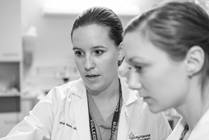Search Results
Viewing: 5811-5820 of 11715 | All
Article
Urodynamics
Urodynamics is a series of tests that are done to see how well the urethra and bladder are working. This Helping Hand will teach you everything you need to know to prepare for your child's tests.
Article
Smoyer Lab
Under the direction of William E. Smoyer, MD, the Smoyer Lab focuses its research around three main themes of nephrotic syndrome, one of the most common kidney diseases seen in children.
Article
Kerlin Lab
Under the direction of Bryce Kerlin, MD, the Kerlin Lab aims to discover new approaches to prevent and treat thrombosis.

Condition
Kidney Stones
Stones in the urinary tract form in the kidneys when small particles, which are usually dissolved in the urine, become oversaturated and begin to form small crystals. These small crystals can continue to grow into larger solid crystals, which resemble sand, gravel or small rocks.
Article
Cara Fuentes Lab
Under the direction of Gabriel Cara Fuentes, MD, PhD, the Cara Fuentes Lab's mission is to improve the quality of life and health of children suffering from rare protein-spilling kidneys diseases, with a primary focus on idiopathic nephrotic syndrome.
Article
Jackson Lab
Under the direction of Ashley Jackson, PhD, the Jackson Laboratory has a primary research focus on congenital and acquired urinary tract obstruction (UTO).

Article
Baker Lab
Under the direction of Linda Baker, MD, the Baker Lab studies the genetics of genitourinary congenital conditions, with a primary focus on Prune Belly Syndrome (PBS).

Condition
Prune Belly Syndrome
Prune belly syndrome (PBS) is a rare condition that affects about 1 in every 50,000 children. Children are born with it. The condition affects belly (abdominal) muscles, bladder and urinary tract, as well as testicles in males. PBS is often found during pregnancy.
